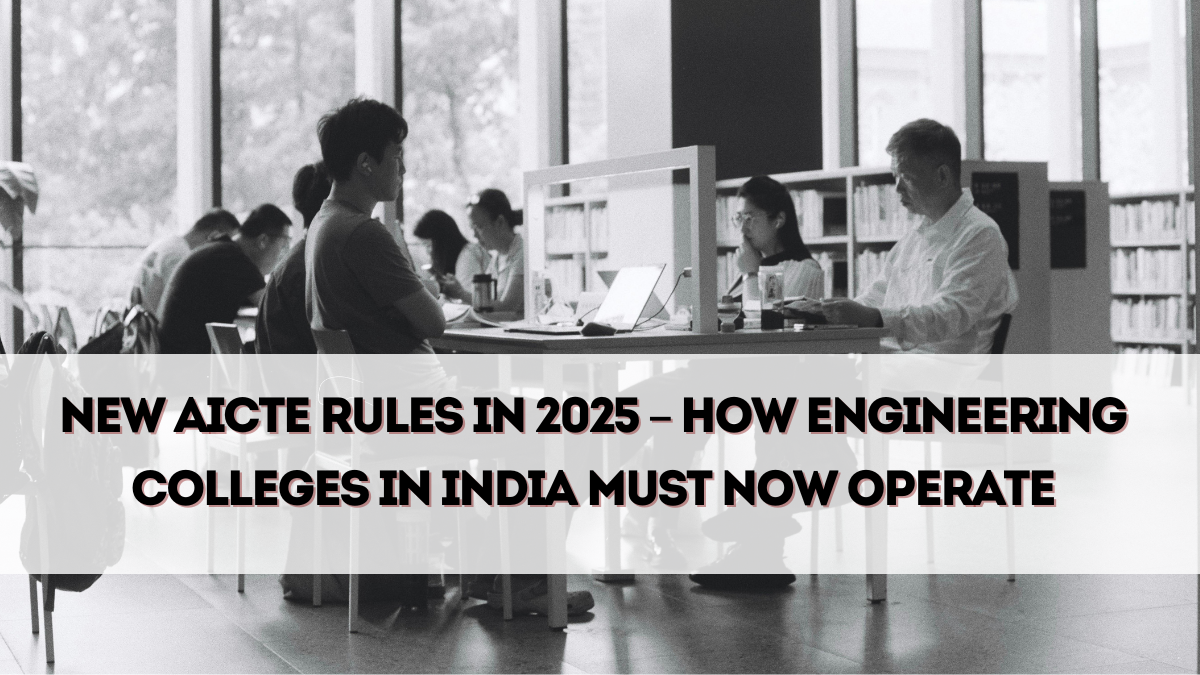The AICTE rules for engineering colleges 2025 have introduced major reforms that will directly impact students, faculty, and institutions across India. The All India Council for Technical Education (AICTE), the regulatory body for engineering and technical education, has released a fresh set of guidelines focusing on quality, innovation, and employability. These changes reflect the government’s broader push toward aligning education with global standards, industry requirements, and the vision of making India a hub for skilled engineers.

Why the 2025 AICTE Reforms Are Important
Engineering education has long faced challenges such as outdated syllabi, low employability, and limited focus on practical learning. The new AICTE rules address these gaps by:
-
Making curriculums more flexible with skill-based learning.
-
Introducing industry partnerships for hands-on training.
-
Emphasizing digital learning platforms and online certifications.
-
Ensuring faculty quality through training and performance assessments.
-
Mandating student-friendly reforms such as internships and credit-based learning.
These reforms are designed to produce engineers who are not only academically strong but also job-ready.
Key Changes in AICTE Rules for 2025
The updated guidelines cover multiple aspects of how engineering colleges must function. The most significant changes include:
-
Revised Curriculum Structure: Colleges must now adopt a more flexible syllabus with electives in areas like AI, cybersecurity, green energy, and robotics.
-
Mandatory Internships: Students must complete internships every year, either in industry, startups, or research labs.
-
Skill Certification Integration: Online certifications from platforms like NPTEL, Coursera, and SWAYAM will be counted as credit-based learning.
-
Faculty Training: Professors are required to undergo regular upskilling programs in pedagogy, research, and technology.
-
Accreditation Standards: Institutions must meet stricter benchmarks for infrastructure, labs, and digital facilities.
-
Startup Support: AICTE is pushing entrepreneurship by mandating innovation labs and incubation centers in colleges.
-
Focus on Employability: Soft skills, communication training, and industry readiness programs are now compulsory.
These changes are reshaping engineering education from a purely academic pursuit into a career-oriented journey.
Impact on Students
For students, the 2025 reforms bring both opportunities and challenges.
-
More Skill-Oriented Learning: Instead of focusing only on theory, students will now engage in projects, internships, and research activities.
-
Global Exposure: Credit transfer systems with foreign universities will allow easier mobility.
-
Better Job Readiness: With mandatory internships and industry-driven electives, students will graduate with hands-on experience.
-
Higher Workload: Students will face more assignments, certifications, and internships alongside academics.
Overall, students benefit from stronger employability but must adapt to a busier schedule.
Impact on Colleges
For engineering colleges, these rules demand major operational changes.
-
Upgrading Infrastructure: Labs, smart classrooms, and digital libraries must be updated to meet AICTE’s new benchmarks.
-
Faculty Recruitment: Institutions will need to hire qualified faculty and invest in their regular training.
-
Industry Partnerships: Colleges are expected to build long-term collaborations with companies for internships and placements.
-
Accreditation Pressure: Failure to meet revised AICTE standards could risk de-recognition or reduced student intake.
While this raises challenges for smaller colleges, it ensures higher educational quality nationwide.
Industries Benefiting from the Reforms
The AICTE reforms also align with the government’s focus on industries that need skilled manpower. Sectors that will benefit include:
-
Information Technology: AI, data science, and cloud computing courses ensure job-ready graduates.
-
Green Energy: Specializations in renewable energy prepare engineers for the future economy.
-
Manufacturing & Robotics: Advanced automation skills will fuel India’s industrial growth.
-
Healthcare Technology: Biomedical engineering and AI in healthcare are gaining prominence.
-
Defense & Space Research: Updated syllabi will strengthen DRDO, ISRO, and related institutions with better-trained talent.
This industry integration ensures engineers are prepared for the jobs of tomorrow.
Challenges in Implementation
Despite the benefits, challenges exist in adopting the 2025 AICTE reforms:
-
Infrastructure Costs: Smaller colleges may struggle with the financial burden of upgrading labs.
-
Faculty Shortages: Recruiting and retaining skilled faculty remains a national challenge.
-
Student Stress: Increased emphasis on internships and certifications could overwhelm students.
-
Uneven Access: Rural institutions may face hurdles in digital adoption and industry partnerships.
Addressing these challenges will require cooperation between government, colleges, and industries.
The Future of Engineering Education in India
With these reforms, AICTE aims to transform India into a global engineering hub by 2030. By focusing on skills, entrepreneurship, and research, Indian engineers will be better prepared to compete internationally. The success of these rules depends on effective implementation, continuous updates, and industry alignment. If executed well, 2025 could be remembered as the year engineering education in India truly modernized.
FAQs
What are the major changes in AICTE rules for 2025?
Mandatory internships, flexible curriculums, industry-driven electives, and stricter accreditation standards are the biggest changes.
How will students benefit from the new AICTE rules?
Students will gain more practical exposure, industry certifications, and better employability after graduation.
Will colleges face challenges in implementing these reforms?
Yes, especially smaller colleges that may struggle with infrastructure and faculty requirements.
Are online certifications now recognized by AICTE?
Yes, platforms like NPTEL, SWAYAM, and Coursera are integrated into the credit-based system.
Do these reforms support entrepreneurship?
Yes, AICTE mandates innovation labs and incubation centers to encourage student startups.
Click here to know more.
